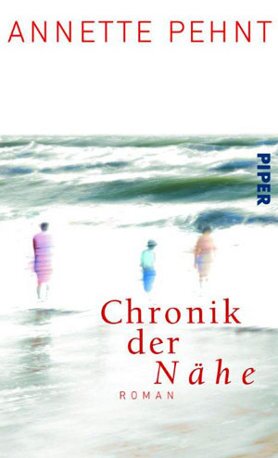Annette Pehnt
Chronik der Nähe
[Chronicle of closeness]
- Piper Verlag
- Munich 2012
- ISBN 978-3-492-05506-2
- 218 Pages
- Publisher’s contact details
Annette Pehnt
Chronik der Nähe
[Chronicle of closeness]
This book was showcased during the special focus on Russian (2012 - 2014).
Sample translations
Review
The narrator’s mother had witnessed the night bombing campaign of the Second World War when she was a child. The daughter, born and raised in peace and prosperity, is plagued by inexplicable fears. As an infant she used to cry incessantly, when she was a little girl, her greatest fear was that her house would burn down. What had been inflicted upon the narrator’s mother during childhood—her own mother had “threatened her with death,” meaning she was emotionally blackmailed into believing her mother’s demise was imminent—has somehow etched its way into her daughter’s psyche so deeply, she fears it will leave an indelible mark on her own children as well. There is a link between the generations, subliminal and invisible, which cannot be severed: psychic wounds and traumas are passed on like a torch, albeit indirectly, with detours and leaps in time.
The narrator, whose relationship to the author Annette Pehnt (b.1967) cannot be overlooked, belongs to a generation that asks questions, delves into their family history for deeper insights, attempts to clarify relationships and find closure. And who, at least in her mind, yearn for a connection; an exchange of experiences and sensations that had been denied their mothers and grandmothers. Pehnt’s novel "Chronicle of Closeness" is about this very real need and this struggle.
The result, strictly speaking, is a chronicle of distance. As vital, intelligent and eloquent, as the women in this family are, they clearly lack empathy and openness. Self-control and a certain coolness have been handed down to them, a flair for hiding their feelings, and a tendency to keep silent at crucial moments, especially when it comes to "the bad stuff". This is ultimately the reason why the narrator knows a lot about her mother and grandmother’s outer life, yet relatively little about the two women’s inner thoughts and feelings. She must face the fact that, by contrast, her mother (the grandmother is dead) has no deeper interest or real understanding of her weaknesses and shortcomings and cares very little about the workings of her psyche.
But everything repeats itself: power games, pursuit of love, competitive situations, and above all, the child's fear of abandonment. The protagonist states half in irony and with a good measure of grief: "Now you’re threatening me with death," an allusion to her grandmother’s hysterical affectations. In fact, the mother is lying in the hospital and she doesn’t have long to live. The daughter has only seven days left to talk to her mother at her sick-bed, to reminisce about past encounters and conversations, reflect on her childhood and youth, and to reconstruct the shared history of the mother and grandmother. It is a war and postwar personal history filled with German reality, much of it dealing with the well-documented times of scarcity and the economic boom years. Annette Pehnt has created a framework for re-telling the story anew, with a distinctly terse language that perfectly suits the emotional reticence of her female characters.
Of course there are men: fathers, husbands, lovers, but they either died early or remain sketchy, and within the constellation of these special relationships, they play only a minor role. The main character is the dying mother, who the narrator reveals from a variety of perspectives: as the "Mama" in the second person singular dialogue form, and as "Annie" in the third person, whose life story she portrays in episodes, while trying to muster as much empathy as she is capable of.
Spectacular events, dramatic conflicts or nice little anecdotes, the usual ingredients of the family saga, are in short supply here. Annette Pehnt has written a truthful, intimate, and universal study of mother-daughter relationships that manages to avoid question marks, even though it is full of explicit and implicit questions. And as if to confirm the suspicion that this is a very personal book, she has incorporated the title of her debut novel, Ich muss los [I’ve got to go] which had established her breakthrough as a novelist in 2001. Here she states: "Mother, I’ve got to go again, but if you come visit me, I’ll invite you for an ice cream at the lake, and you know how much I love you, but I can’t give you a kiss today, I’ve got to go very quickly."

The narrator, whose relationship to the author Annette Pehnt (b.1967) cannot be overlooked, belongs to a generation that asks questions, delves into their family history for deeper insights, attempts to clarify relationships and find closure. And who, at least in her mind, yearn for a connection; an exchange of experiences and sensations that had been denied their mothers and grandmothers. Pehnt’s novel "Chronicle of Closeness" is about this very real need and this struggle.
The result, strictly speaking, is a chronicle of distance. As vital, intelligent and eloquent, as the women in this family are, they clearly lack empathy and openness. Self-control and a certain coolness have been handed down to them, a flair for hiding their feelings, and a tendency to keep silent at crucial moments, especially when it comes to "the bad stuff". This is ultimately the reason why the narrator knows a lot about her mother and grandmother’s outer life, yet relatively little about the two women’s inner thoughts and feelings. She must face the fact that, by contrast, her mother (the grandmother is dead) has no deeper interest or real understanding of her weaknesses and shortcomings and cares very little about the workings of her psyche.
But everything repeats itself: power games, pursuit of love, competitive situations, and above all, the child's fear of abandonment. The protagonist states half in irony and with a good measure of grief: "Now you’re threatening me with death," an allusion to her grandmother’s hysterical affectations. In fact, the mother is lying in the hospital and she doesn’t have long to live. The daughter has only seven days left to talk to her mother at her sick-bed, to reminisce about past encounters and conversations, reflect on her childhood and youth, and to reconstruct the shared history of the mother and grandmother. It is a war and postwar personal history filled with German reality, much of it dealing with the well-documented times of scarcity and the economic boom years. Annette Pehnt has created a framework for re-telling the story anew, with a distinctly terse language that perfectly suits the emotional reticence of her female characters.
Of course there are men: fathers, husbands, lovers, but they either died early or remain sketchy, and within the constellation of these special relationships, they play only a minor role. The main character is the dying mother, who the narrator reveals from a variety of perspectives: as the "Mama" in the second person singular dialogue form, and as "Annie" in the third person, whose life story she portrays in episodes, while trying to muster as much empathy as she is capable of.
Spectacular events, dramatic conflicts or nice little anecdotes, the usual ingredients of the family saga, are in short supply here. Annette Pehnt has written a truthful, intimate, and universal study of mother-daughter relationships that manages to avoid question marks, even though it is full of explicit and implicit questions. And as if to confirm the suspicion that this is a very personal book, she has incorporated the title of her debut novel, Ich muss los [I’ve got to go] which had established her breakthrough as a novelist in 2001. Here she states: "Mother, I’ve got to go again, but if you come visit me, I’ll invite you for an ice cream at the lake, and you know how much I love you, but I can’t give you a kiss today, I’ve got to go very quickly."
Translated by Zaia Alexander

By Kristina Maidt-Zinke
Kristina Maidt-Zinke is a book and music critic at the Süddeutsche Zeitung and also writes reviews for Die Zeit.
